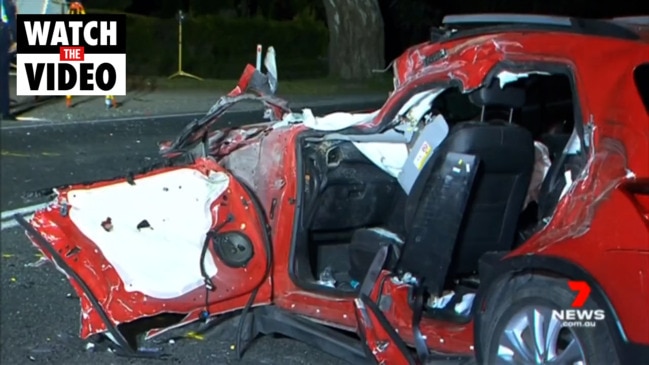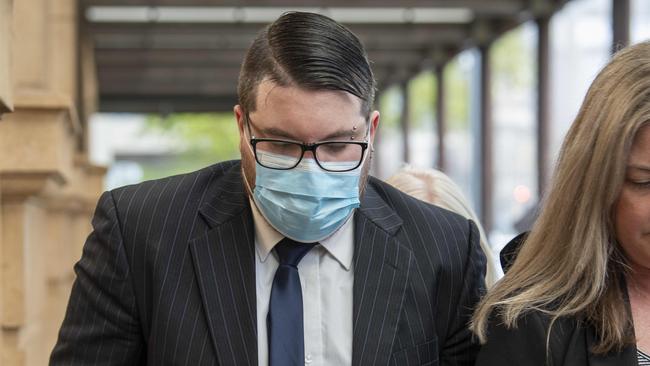Killer drivers Leif Branscheid, Lisa Trewren and Campbell Henderson grouped together in landmark drink, drug driving appeal
Courts are becoming unwilling to jail drugged and drunk drivers who kill people – and things must change, the state’s top prosecutor says.

Police & Courts
Don't miss out on the headlines from Police & Courts. Followed categories will be added to My News.
Killer drug-affected and drunk drivers are being handed inadequate prison sentences because of an “erosion” in the District Court’s willingness to send them to jail for lengthy periods, the state’s top prosecutor has argued.
Three high-profile sentencing appeals have been grouped together and argued before the Court of Appeal to give a platform for condemnation of light punishments for killer drivers.
Director of Public Prosecutions Martin Hinton KC asked the court to consider the appeals of Lisa Trewren, Leif Branscheid and Campbell Henderson together as a “subset” of dangerous driving cases leading to death.
All three drivers were affected by drugs or alcohol when they killed someone while behind the wheel of a car.
Mr Hinton told the court, which consisted of Court of Appeal President Mark Livesey, Appeals Justice Sophie David and Auxiliary Appeals Justice Kevin Nicholson, there had been a hardening of attitudes towards dangerous driving.
“If you go back to the late 80s when some of us were at university, there was no such thing as random breath testing,” he said.
“When you come forward in time with respect to the various laws that deal with the policing of drink driving and subsequently drug driving, you see in those laws a reflection of the community’s attitude toward the risk that drink and drug drivers pose on the road.
“We get to the point where as a community our knowledge of that risk is such that it must be reflected in deterrent sentences imposed by the District Court – and indeed by this court.”

Mr Hinton said that the dangers of drink and drug driving had been advertised so thoroughly through public campaigns and police activity that the knowledge must now be considered part of the public psyche.

“The community is constantly reminded,” he said. “The warnings are endless, warnings upon warnings upon warnings.
“So when it comes to the decision to drive having drunk excessively, the offender must be imputed with that knowledge.
“Sentences must reflect the fact that we know that driving intoxicated, whether it be by reason of drink or drugs, is inherently dangerous.”
A causing death by dangerous driving charge carries a maximum sentence of 15 years in jail. The maximum is increased to life in prison if the charge is “aggravated”, for example when the killer driver was drunk, on drugs or involved in street racing.
Mr Hinton said he was not asking the Supreme Court to set a new sentencing standard for drivers who caused death while under the influence of drugs or alcohol, but he wanted District Court sentences to better reflect existing laws.
In 2020, the court set the current standard in the case of Akol Agiu Akol, who killed Bor Mabil in a high-speed crash while drunk in the northern suburbs.
Akol was initially sentenced to three years, one month and 25 days imprisonment for causing Ms Mabil’s death.
On appeal, that sentence was extended by more than a year to four years, six months, two weeks and four days. He became eligible for parole late last year.

The decision in Akol’s case was reaffirmed when the Court of Appeal reduced the sentence handed to methamphetamine-affected driver Michelle Bubner, who killed brothers Motjaba and Mohammad Mohammadi in a crash in May 2020.

The Court of Appeal reduced her total sentence and set the penalty for each death as six years imprisonment.
Mr Hinton said the sentencing standard set by the Supreme Court had been “eroded” in the District Court, which deals with death by dangerous driving charges.
“You don’t always see (those standards) reflected in the sentenced in the court below,” he said.
Trewren was jailed for six years for killing Adelaide Hills man David Hoy while driving at three times the legal limit after drinking 12 stubbies.
She is appealing against the length of her sentence. Paul Charman, for Trewren, said his client’s remorse had not been taken into account by the sentencing judge and her penalty should be reduced.
Branscheid had meth, heroin and valium in his system when he killed 46-year-old Alina Andrews in a crash at Kersbrook. He was jailed for nine years.
He is also appealing against the length of his sentence. Ben Armstrong, for Branscheid, told the court his client was “not beyond hope” and the sentence should be reduced to allow for better rehabilitation.
Henderson was sentenced to home detention for killing his best friend Nicholas Pert in Brukunga while driving at 118km/h while drunk.
Mr Hinton argued the sentence was so low it could not be tolerated against a background of constant messaging about the dangers of drink driving.
The court reserved its decision on all three cases to a later date.




